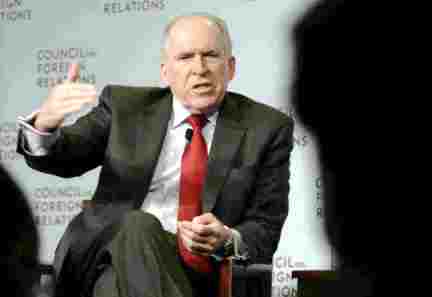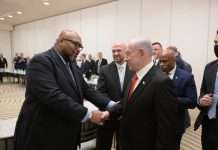CIA Says Muslims Join ISIS Because of … Economics
Raymond Ibrahim/PJ Media
March 24, 2015
Speaking at the Council of Foreign Relations on March 13, CIA Director John Brennan said that “the Islamic State had ‘snowballed’ beyond Iraq and Syria, estimating that at least 20,000 fighters from more than 90 countries have gone to join the militant group, several thousand of them from Western nations, including the United States.”
“Left unchecked, the group would pose a serious danger not only to Syria and Iraq, but to the wider region and beyond, including the threat of attacks in the homelands of the United States and our partners,” said Brennan. Left unclear in his speech is why the Islamic State—which Obama and his crew regularly insist has nothing to do with Islam—is “snowballing”; why 20,000 “fighters” (AKA “Muslims”) are joining it.
Almost one year ago to the day, however, at the same Council of Foreign Relations gathering, Brennan did explain what makes Muslims from all around the world join the Islamic jihad (then under the rubric of “Al-Qaeda”). After assuring all in attendance that al-Qaeda’s ideology is “a perverse and very corrupt interpretation of the Qur’an”; that “al-Qaeda has hijacked” Islam; that “they have really distorted the teachings of Muhammad”—Brennan still confirmed that, even so “that ideology, that agenda of al-Qaeda has gained resonance and following in many parts of the world.”
When asked why such a “perverse and very corrupt” understanding of Islam—one that has “distorted the teachings of Muhammad”—so resonates among Muslims, the CIA responded by saying that it was being “fed a lot of times by, you know, political repression, by economic, you know, disenfranchisement, by, you know, lack of education and ignorance, so there—there are a number of phenomena right now that I think are fueling the fires of, you know, this ideology.”
Interestingly, if you watch the video clip of Brennan’s speech, you will note that he only “you knows” in the above quotation (four times) and right before it, when he says that al-Qaeda has “distorted the teachings of Muhammad, you know, for violent purposes.”
The rest of his talk is relatively smooth.
Could Brennan be self-conscious of his own equivocations—hence all these stilted “you knows” in one sentence?
Could he be aware of the Rand Corporation report on counterterrorism, prepared for the Office of the Secretary of Defense in 2009? It found that “Terrorists are not particularly impoverished, uneducated, or afflicted by mental disease. Demographically, their most important characteristic is normalcy (within their environment). Terrorist leaders actually tend to come from relatively privileged backgrounds.”
Or consider the following excerpt from Understanding Terror Networks, by Marc Sageman, a former CIA officer who worked closely with jihadi groups in Afghanistan (emphasis mine):
There was a definite shift in degree of devotion to Islam in adulthood by the mujahedin [jihadis], preceding their recruitment into the jihad. This is not surprising given the fact that the global Salafi jihad is a Muslim revivalist organization. Of the 155 mujahedin on whom I could find relevant information, all but one were considerably more devout right before joining the jihad than they had been as children. More than 99 percent were very religious at that time, often donning Afghan, Pakistani, or traditional Arabic garb and growing beards…
“Devotion to Islam” is what causes Muslims to join the Islamic State. Despite this very obvious fact, Obama officials constantly deny it, offering more “sensible” motives. Thus during a recent interview on MSNBC’s Hardball, State Department spokesperson Marie Harf said that one of “the root causes that leads people to join these groups,” a reference to the Islamic State, is a “lack of opportunity for jobs.”
“Political repression,” “economic disenfranchisement,” “lack of education and ignorance,” and now a “lack of opportunity for jobs.” These, according to the Obama administration, are why countless, nameless Muslims from all around the world are waging jihad—not the commonsensical fact that jihad is integral to Islam, doctrinally and historically.
A final point of interest. This widespread tendency to project Western cultural explanations onto non-Western people is the height of arrogance and ethnocentrism—precisely what progressives and multiculturalists constantly warn against. Yet the irony is that such “open-minded” proponents of cultural relativism are also the ones most prone to ignore Islamic teachings. When Brennan, Harf et al insist that jihadis are really not motivated by religion but rather are products of political, economic, and social forces, is this total dismissal of the “other” and his peculiar motivations (in favor of familiar, Western paradigms) not the epitome of cultural arrogance?




















